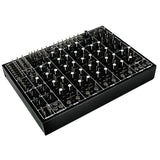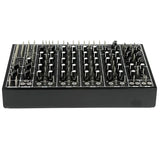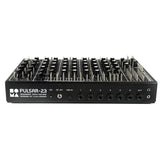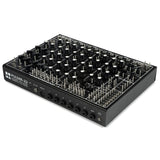The Soma Pulsar-23 is an organismic semi-modular drum machine and synthesizer comprising twenty-three independent modules, including four drum voices with different architecture, four envelope generators, four looper recorders, a clock generator with dividers and a unique controlled chaos generator.
The Soma Pulsar-23 completely reinvents the concept of analogue drum machines thanks to a clever design. Semi-modular, the Pulsar-23 can be used straight out of the box without needing patching. However, using the wealth of inter and intra-connectivity opens up a sonic and rhythmic experimentations and discovery world.
A Flurry of Connectivity
Patching connections are made using alligator clips and binding posts instead of the traditional ⅛” and ¼” cables. This system offers much more flexibility than standard connections allowing for the connection of several cables to the same post but also increases the possibility for human interactions allowing for the connections of binding posts with fingers.
Many binding posts can function as inputs or outputs, and inputs can mix multiple signals automatically. This allows clock and modulation signals to simultaneously create complex and interrelated relationships in what the designer calls Organismic.
Powerful Voicings
The Pulsar-23 has four voices, each voice tuned and designed to fulfil specific applications:
BD
This section is specifically designed to create analogue bass drums. In addition to the usual Pitch and Tune controls, this section includes a Drive unit for waveshaping applications, adding girth and grit. It can go from subtle to grungy industrial sounds.
Bass
This voice contains a whole subtractive mono synth section with waveform selection and a low pass filter. It can also be configured as an additional percussion instrument with a simple switch.
SD
This section is for snare drums and clap applications and includes a band-pass filter, a clap control, and the usual analogue snare controls.
HHT
The HHT uses white noise as the primary sound source and a high-pass filter to control the tonality.
All four voices include dedicated Attack and Decay with independent binding posts allowing each voice to modulate another. FX controls let you assign each voice to the DSP Reverb and Delay section
Further sound-shaping capabilities are also provided courtesy of the distortion module on the master, which offers controls for the amount of Drive and a Mix knob to select the amount of dry signal to pass through. It also includes a DSP Delay and Reverb section to add depth and space. Delay options include a choice of 1-tap, 2-tap, dual and pitch shift delay, while the reverb is based on a “hall” sound. These effects can be used independently or in series for more. Many controls are available to modulate via the binding posts.
Sequencer
Soma brought a fresh approach to sequencing. Instead of the traditional step sequencer, the Pulsar-23 has adopted an approach reminiscent of working with tape loops, allowing the user to record sound events at the press of a pad which reacts to start time but also length.
These “loops” have extremely high resolution allowing for real human feel. Each voice has its rhythmic quantiser to lock any of them to a chosen grid. it also has an internal memory allowing four banks of four sequences to be saved for easy recall.
It also includes a powerful MIDI integration allowing for assigning MIDI messages to drum parameters accessed via the Learn function or one of the four MIDI to CV binding posts. The Bass voice can also be fully controlled via MIDI, allowing the playing of bass lines from an external keyboard. Using 1V/oct, it offers excellent pitch tracking over five octaves.
External clocking is possible via MIDI and an analogue clock for syncing the Pulsar to external devices. The internal or external clocks can be divided into seven unique clock divisions, which can trigger inputs and LFO sync or anywhere else to offer synchronised control. Clock divisions can be patched between themselves to create unique swing patterns. Clock sync modulation can be created by controlling the LFO frequency with an external CV.
SHAOS
If this wasn’t enough, Soma Synths added another level of unpredictability via its SHAOS module, which adds a pseudo-random voltage generator to use shift registers combined with a sample and hold circuit to create sequences of stepped voltages. SHAOS has three modes. The first 1-bit mode offers a choice of two states, while the 2-bit mode offers four states and the 3-bit, eight states. The length of the pseudo-random sequencer can be selected between 63, 16 and 217 modes.
A Plethora of Utilities
If this wasn’t enough, The Pulsar-23 offers many more functions often designed to communicate and often found in traditional modular systems. These include four attenuators for adding depth control to any parameters. Furthermore, the VCA also accepts audio and CV signals to create dynamic variation. Eight 1/8” to binding post adapters and six 1/4” to binding posts over bi-directional communication with Modular systems.
Additional features include CV-controllable inverters, gate-controlled electronic switches, triggered impulse generators, and more. This machine begs to be discovered and explored.



 +44 20 8445 2446
+44 20 8445 2446











